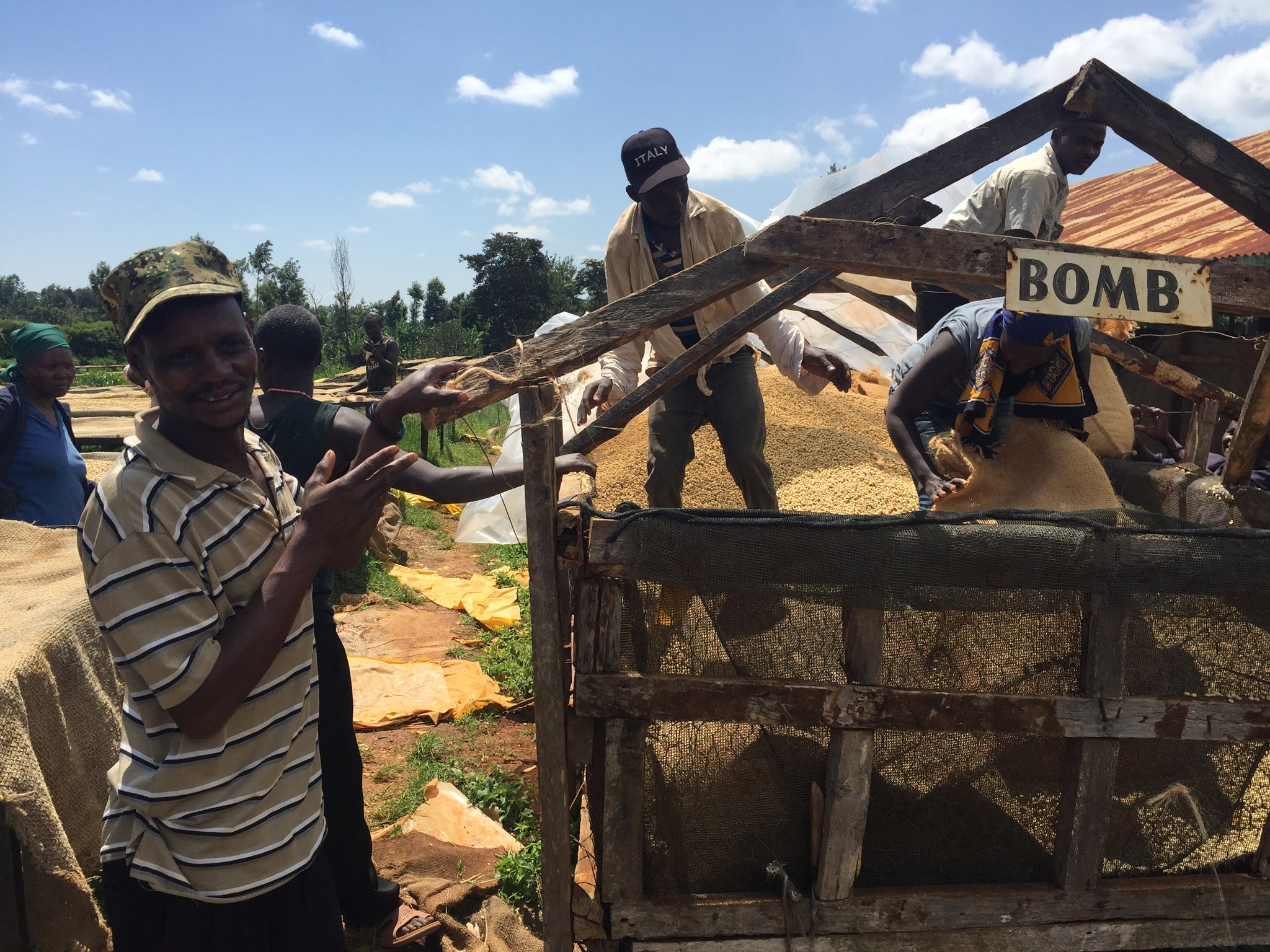
AB Kii / KENYA
AB Kii / Kenya
Flavor Profile :
Red currant, Lemon, Elder flower, Hibiscus tea.
Origin:Kenya
Factroy:Kii Factory
Cooperative:Rung’eto Farmers Cooperative Society
Region:Kirinyaga > Embu
Variety:SL28, SL34, Ruiri 11, and Batian
Process:Washed
Altitude:1600 - 1800 masl
Harvest : 2024
At the end of February this year, we once again visited our suppliers in Kenya to conduct cuppings for purchasing. As in previous years, we were fortunate to encounter many coffees and had the opportunity to taste hundreds of cups.
This visit came right after changes to the coffee distribution rules within Kenya. While people in the supply chain were anxious, they were also hopeful and striving to adapt to the new rules. Amidst this situation, we focused on finding high-quality coffees.
Our visit to Kenya in late February coincided with the high season for purchasing, just after the main crop harvest and processing had been completed. We've always felt that the coffee from the Kii Factory maintains high quality year after year, but this year it particularly stood out on the cupping table.

This coffee is produced at the Kii Factory, a member of the Rungeto Farmers Cooperative Society in central Kenya. Kii is one of three wet mills managed by Rungeto FCS in Kirinyaga and has obtained Fair Trade certification.
Rungeto FCS was established through the merger of three factories: Kiangoi, Karimikui, and Kii. The cooperative's chairman has implemented quality-focused processes across all Rungeto FCS factories. For instance, tiles have been installed in all washing channels and fermentation tanks. Additionally, the water used in processing is being recycled.
The farmers belonging to Rungeto FCS cultivate their crops on the slopes of Mount Kenya, an area known for producing rich, complex, and flavorful coffees.

Most Kenyan coffee is processed using the washed method. The coffee cherries are carefully hand-picked and delivered directly to wet mills or collection points. There, they are transferred to sorting mats or tables where unripe or damaged cherries are removed.
After sorting, the cherries are weighed, and then the processing continues using the washed method. This meticulous process ensures the high quality that Kenyan coffee is known for.

The detailed steps of the washed method are as follows:
- The coffee cherries are placed in a water tank to remove any unripe cherries that float.
- A disc pulper is used to remove the fruit flesh, leaving the coffee beans protected by their parchment.
- After pulping, the beans are sorted by weight using water. This separates high-quality, dense beans from lighter, lower-quality ones.
- The beans then undergo dry fermentation overnight, which breaks down and washes away the sugary mucilage adhering to the parchment.
- Further sorting is done using water channels (heavier beans that sink to the bottom of the channel are considered higher quality and sweeter).
- The beans are then soaked in clean water for 24 hours. This process is said to enhance the beans' proteins and amino acids, resulting in more complex acidity and improved cup clarity.
- After soaking, the coffee is spread out on raised drying beds (also called African beds) and constantly turned to ensure even drying. During this process, any defective beans are identified and removed.
- The time on the drying beds varies depending on climate, ambient temperature, and the volume being processed. It can take 1-3 weeks to reach the target moisture content of 11-12%.
This careful processing contributes significantly to the renowned quality and unique flavor profile of Kenyan coffee.


Farmers often have multiple options in their area and can freely choose which factory to deliver their cherries to. In Kenya's traditional auction system, quality is paramount, with higher quality coffee commanding higher prices.
Factories that produce high-quality coffee often attract more farmers because they can offer higher payouts. After deducting marketing and preparation costs, these factories can sometimes return up to 90% of the sale price to farmers as a second payment.
Transparency is a crucial feature of the Kenyan system. Everything is clearly divided into small lots and different grades. Farmers know exactly what portion of the sale price will be returned to the cooperative after processing costs are deducted.
Many cooperatives and factories compete to provide the best returns to farmers, with some able to reimburse up to 90% of the sale price. This competitive system encourages quality production and fair compensation for farmers.
This unique combination of meticulous processing and a transparent, quality-focused economic system contributes to the renowned quality and distinctive characteristics of Kenyan coffee.



